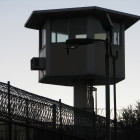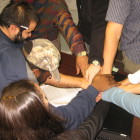
OP-ED: Time to Talk to the New Politicians and Save Some Lives
|
What do state politics have to do with juvenile justice? Just about everything.
Juvenile Justice Information Exchange (https://jjie.org/page/241/)

In late September, Torri was driving down the highway with her 11-year-old son Junior in the back seat when her phone started ringing.
It was the Hamilton County Sheriff’s deputy who worked at Junior’s middle school in Chattanooga, Tennessee. Deputy Arthur Richardson asked Torri where she was. She told him she was on the way to a family birthday dinner at LongHorn Steakhouse.
“He said, ‘Is Junior with you?’” Torri recalled.
Earlier that day, Junior had been accused by other students of making a threat against the school. When Torri had come to pick him up, she’d spoken with Richardson and with administrators, who’d told her he was allowed to return to class the next day. The principal had said she would carry out an investigation then. ProPublica and WPLN are using a nickname for Junior and not including Torri’s last name at the family’s request, to prevent him from being identifiable.
When Richardson called her in the car, Torri immediately felt uneasy. He didn’t say much before hanging up, and she thought about turning around to go home. But she kept driving. When they walked into the restaurant, Torri watched as Junior happily greeted his family.
Soon her phone rang again. It was the deputy. He said he was outside in the strip mall’s parking lot and needed to talk to Junior. Torri called Junior’s stepdad, Kevin Boyer, for extra support, putting him on speaker as she went outside to talk to Richardson. She left Junior with the family, wanting to protect her son for as long as she could ...

What do state politics have to do with juvenile justice? Just about everything.

Sentenced to life in prison at the age of 15, Julie Anderson’s 34-year-old son Eric, along with roughly 80 fellow Illinois inmates, has received his first hope for freedom since he sat in a courtroom 19 years ago.

Although the media, members of the public and even some JPOs, prosecutors and judges colloquially refer to juvenile court as “kiddie court,” presuming it has few negative effects on children, research indicates that the impact of juvenile court processing is not benign.
A Chicago man sentenced to life in prison at age 14 now has the chance for a new sentence. The U.S. Supreme Court ruled in 2012, Miller v. Alabama, that giving a juvenile a mandatory life sentence was the equivalent of cruel and unusual punishment. Addolfo Davis' lawyers had argued that his case was covered under that sentence. The Illinois Supreme Court ruled he could be resentenced. The Illinois attorney general's office then appealed to the Supreme Court, which declined to hear the case, clearing the way for Davis to be resentenced.

The first time I was called a sex offender, I was 13. These words meant nothing to me. The only context I had for them was the old man down the street who parents whispered about, saying he was a sex offender.

Juveniles incarcerated in adult prisons face a host of adverse health impacts. New research presented at the American Public Health Association conference shows they are also more than two times as likely to be placed in solitary confinement.
North Carolina and New York are the only two states in the country that try 16- and17-year-olds as adults in their criminal justice systems.
The negative health impacts of adolescents incarcerated in adult prisons are well documented. Adolescents face significantly higher risks of sexual victimization, physical assault and recidivism when they are incarcerated with adults.

Editor’s Note: Nine national juvenile justice advocacy organizations collaborated on the statement below in response to the Ferguson, Mo., grand jury decision not to indict Officer Darren Wilson for fatally shooting Michael Brown. We stand in solidarity with Michael Brown and his family and their supporters in Ferguson, Mo., and across the nation. Michael Brown’s fate — killed by a police officer and denied justice — is yet another example that black and brown children are not always protected by our nation’s laws and that the justice system works differently for different people. We fully understand how some communities have lost faith in the system. In both Ferguson and other communities, we have failed our youth of color in profound ways.

NEW YORK — Jordyn Lexton used to teach high school English to minors at Riker’s Island. Until the day one student said, “No disrespect, I really appreciate what you’re trying to do here, but you are selling dreams.”